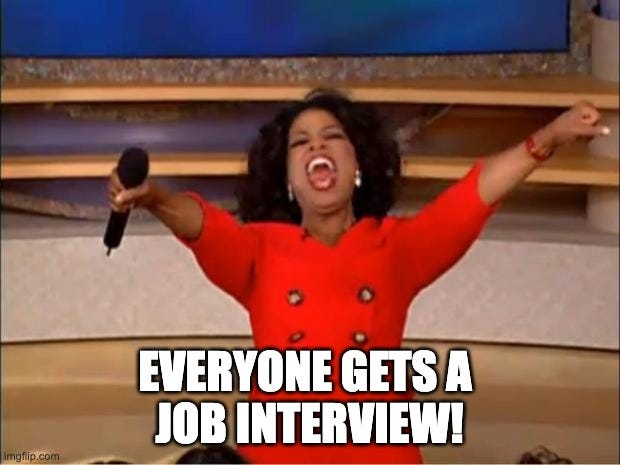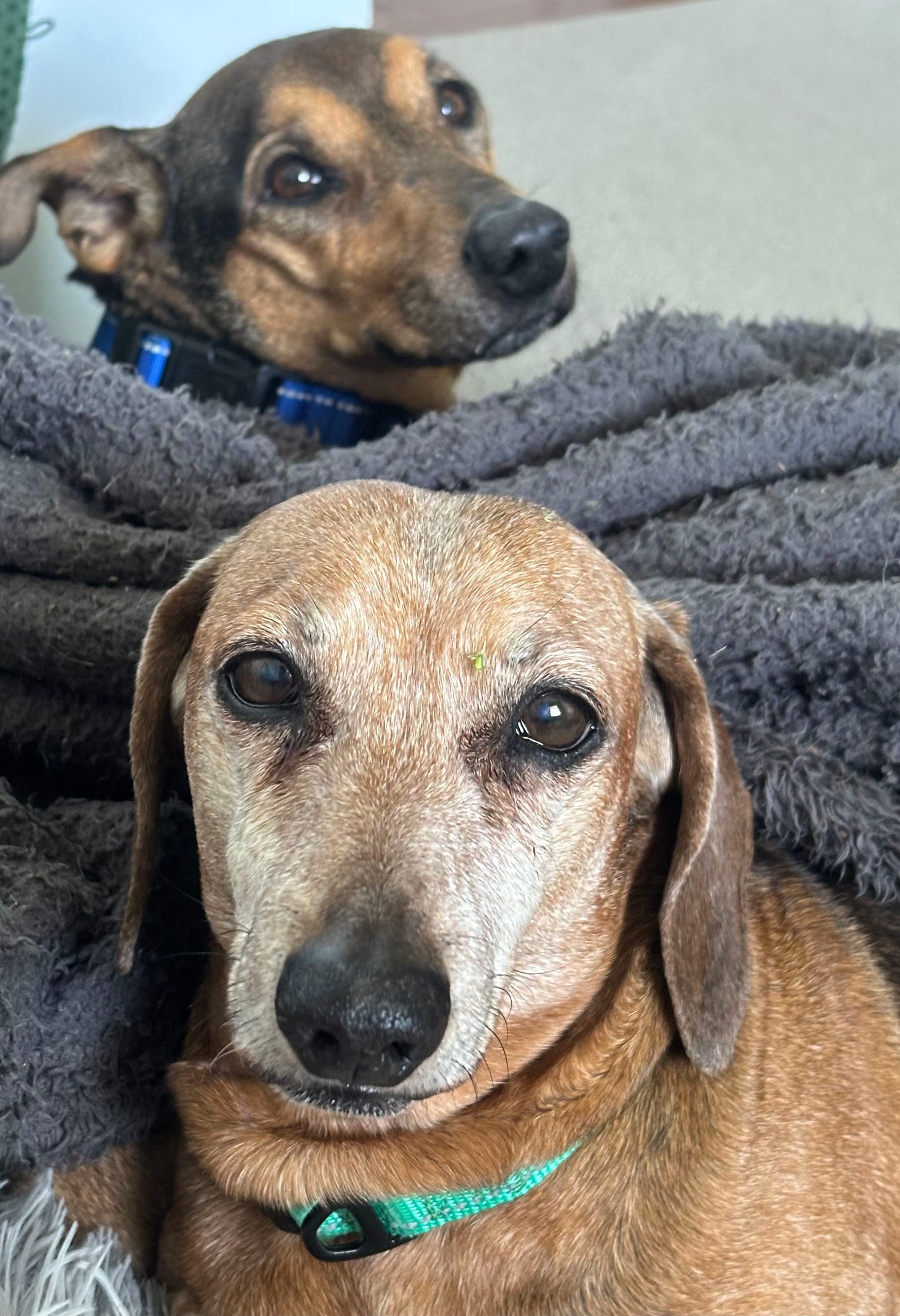My job interview with the enemy
How a 60-second video stirred outrage (and opened my eyes to something bigger)
When I posted a video of myself doing a fake job interview by an AI recruiter named "Jane" on LinkedIn this week, the comments poured in:
"Dehumanising."
"Disgusted."
"A complete and utter deal breaker."
I get the visceral reaction. The experience was... odd (watch below).
And yes, it is jarring to watch something as human as a job interview get handed over to a robot. Like one commenter wrote (fairly): If you can't handle the hiring process, leaders, then you can't handle your business, period.
BUT —
Was this experience fundamentally different from a recruitment screening process, where you need to record a one-way video submission, or complete a 100-question "personality assessment"?
Not really.
If you watch the video you’ll see Jane, my AI interviewer was unfailingly polite.
When I responded off-script about the fake job, she guided me back on track, clinically (with maybe a bit of a smirk…It’s almost Mona Lisa-esque, right?).
I'm not here to defend, or shut down this technology.
I simply want us to pause and consider it thoughtfully, rather than immediately branding it as the enemy.
Modern hiring is already dehumanising
We're horrified by the shiny new "problem" of AI recruiters, yet we've silently accepted the dumpster fire modern hiring has become.
Here's what's genuinely dehumanising:
→ Spending hours tailoring a resume, only to be ghosted into oblivion.
In Australia, nearly 90% of job seekers have experienced ghosting. In the U.S., it's 77%. (btw, I did a podcast episode about this, it’s something I feel strongly about).
The mental toll from this lack of certainty and feedback is severe, contributing to anxiety and stress among job seekers.
These numbers are a sign of a system under strain.
This is where technology, used thoughtfully, could offer a solution.
The potential benefits of AI recruiters
An automated system doesn't "forget" or get "too busy." It can instantly confirm your application was received and provide updates, solving one of the most frustrating parts of the job search.
Here are just a few ways where thoughtfully applied AI might offer solutions:
Everyone gets an interview (a line Steph Clarke dropped while we were voice noting on this topic)
You can use this tech as part of the initial screening process, or simply use the avatar to respond to job queries 24/7. Using this tool, the recruitment process starts immediately after a job ad is posted. You peruse the job ad, click to jump on an AI avatar call with the CEO, leader, or founder. Ask detailed questions about the role, the culture, the company, and then decide, "Yeah! I want to interview."
This means everyone who applies can have an interview, rather than being represented by a 2-page outline of their career history and achievements. Isn't this fundamentally more inclusive?
You access global talent through instant language translation
With real-time language translation, organisations can access a truly global talent pool. Imagine a brilliant candidate in Tokyo interviewing for a role in Melbourne, with AI seamlessly translating the conversation in real-time. Btw, real-time translation on virtual calls is now a feature that Google offers.
The attraction and repulsion factor
Yes, AI recruiters will repel certain people. But isn’t that what you want to do in a recruitment process? It will also attract early adopters and people who love bright shiny objects (like me).
The cost-savings reality
I have to mention it: There's massive cost-saving potential here. When Goldman Sachs receives 315,126 applications for internships, Google gets over 3 million applications, and McKinsey receives more than 1 million, the traditional human-only approach is expensive. You can free up human recruiters to focus on what they do best: building relationships and having meaningful, in-depth conversations with qualified candidates.
Sure, the tech has in-built bias…But SO DO HUMANS! A key concern in the comments was the loss of the "human touch." Human connection is vital, but we also have to be honest about its challenges. Decades of research show that human-led interviews can be unintentionally biased.
A landmark study found resumes with "white-sounding" names received 50% more callbacks than identical ones with "Black-sounding" names.
64% of older workers report experiencing or seeing age discrimination.
Interviews often unintentionally filter out neurodivergent talent due to a focus on specific social cues instead of skills.
This is our opportunity to improve. An AI, if (and that IF is very important) designed correctly, can eliminate many of these variables.
In Sweden, an AI interviewing robot named Tengai is already being used for this reason: to deliver a transcript of a candidate's answers, free from human judgement about their accent or demeanour.
Here’s the point I’m trying to make
Yes, it is disturbing but used thoughtfully, there are opportunities to turn the soul-crushing initial phase of a job hunt into something more direct, transparent, and engaging.
Companies are already doing this. Woolworths and Qantas in Australia use AI chatbots from Sapia.ai to conduct initial text-based interviews.
McDonald's uses the "Olivia" chatbot to process millions of applications. Unilever saved over 100,000 hours of recruiter time using HireVue's AI video analysis.
The bots are here to stay.
We need transparency - candidates must always know they're talking to an AI. AI won't replace the human conversations that are essential for hiring. But it can handle the repetitive, administrative drudgery of screening.
Oh, and in case you were wondering?
I discovered Jane while experimenting with a tool called Tavus.
And no, she didn’t ask me back for a second interview…
What do you think?
Would you try an AI interview - or does the whole idea make your skin crawl?
👇 Drop your thoughts in the comments.
💙 And if this gave you something to think about, hit the heart. It helps more people find it.
Leanne “rejected by a bot” Hughes
p.s. Btw, my adorable sausage dog, Quincey, turned 14 yesterday! Here’s a pic of him (with Milo in the background) glaring as I type this email (as you can see, he’s unimpressed).





Wow! She was a bit snippy about you asking about the AI process wasn't she. I'm assuming that this is in place of a phone screen or one of those scenarios where you answer questions on video, and not the final interview.
Also, if AI is taking all of our jobs, who will the AI interviewer interview? Other AIs?
Just kidding - it's important to keep up with innovations like this!
I think the point you make about the job search process already being dehumanising is critical here. And you’re right that this isn’t really any different than having to turn your CV into some bland, ATS-friendly document that in no way represents your potential or brilliance. But we’ve just accepted that.
So yes, this type of tool might make that both better (for the ways you laid out) but also worse. Because it just gives a new shiny tech band-aid way for orgs to race to the bottom when it comes to candidate experience, rather than rethinking the whole process. This seems to be a trend with AI at the moment; use it to make the crap thing faster, rather than fixing / removing the crap thing.
As with most things, when you scale it, you’re probably making it shit.